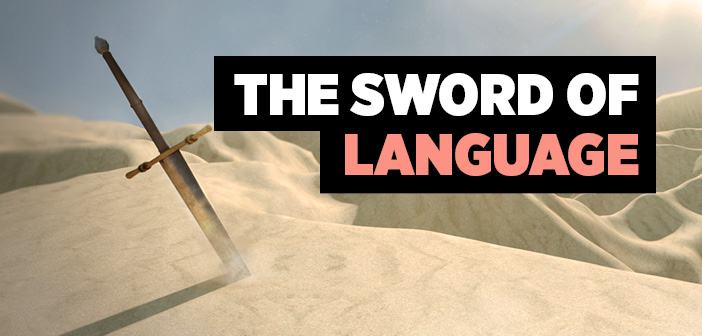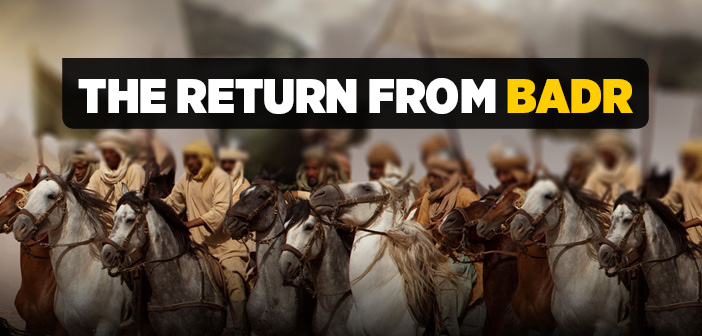What does the sword of language means in islam?
The Blessed Prophet -upon him blessings and peace- sent a small cavalry unit under the leadership of Uyaynah -Allah be well-pleased with him- to the Banu Tamim tribe, for having recoiled from paying alms. In a swift raid, the Believers triumphed over the rebels and returned to Medina with a sizeable amount of spoils and captives.[1]
A large number of Banu Tamim’s notables, accompanied by their leading poets, thereupon came to the Noble Messenger -upon him blessings and peace- to salvage their captives. While waiting for the Blessed Prophet -upon him blessings and peace- to appear inside the Masjid, they grew impatient and shouted rather disrespectfully “Come on now! Come out next to us!”
The Blessed Prophet -upon him blessings and peace- felt ill-at-ease from all their shouting. Revealed moments later, was the following ayah:
“As for) those who call out to you from behind the private chambers, surely most of them do not understand.” (al-Hujurat, 4) (Ibn Hisham, IV, 223, 233)
Following zuhr salat, the Blessed Prophet -upon him blessings and peace- sat in the courtyard of the Masjid.
“We have brought our poets and orators so we can recite poems to each another”, said the spokesman of the tribe.
“I have not been sent to recite poems”, responded the Blessed Prophet. “But you can go ahead.” (Ibn Athir, Usd’ul-Ghabah, I, 128)
A man from the tribe then rose to his feet and gave an eloquent speech. The Blessed Prophet -upon him blessings and peace- then signaled for Thabit ibn Qays -Allah be well-pleased with him-, who then got up and delivered an exceptional speech on the splendor of Allah, glory unto Him and the prophethood of the Noble Messenger -upon him blessings and peace- , far more superior than that delivered by the spokesperson of Tamim.
A poem recited by Zibriqan ibn Badr from Banu Tamim was then countered by an eloquent and affective ode, delivered by the illustrious Hassan ibn Thabit -Allah be well-pleased with him-, paying homage to the honor of the religion of Islam
The triumph of the Companions was due to their immersion in the Holy Quran, an extraordinary pinnacle of language, and from their training in the presence of the Messenger of Allah -upon him blessings and peace-, the most articulate and beautiful speaker ever to come, known therefore as jawami’ul-kalim for his divine ability to express profound meanings in just a few simple words. This inspiration exuded by the Blessed Prophet -upon him blessings and peace- has been given a splendid voice in the poem:
Seeing him for one moment, into a rose one turns,
Nightingales, they become, who hear his words…
Aware of the outcome, poet Aqra ibn Habis from Tamim exclaimed, “His orators are better than our orators and his poets are far more superior to ours. Their words are simply above ours!” After these words, he declared his acceptance of Islam, a move his friends followed without hesitation. The Blessed Prophet -upon him blessings and peace- then handed an abundant amount of gifts to the members of the envoy. (Ibn Hisham, IV, 232)
At that point, a minor argument erupted between Abu Bakr and Omar -Allah be well-pleased with them- in the presence of the Noble Prophet -upon him blessings and peace-, occasioning the revelation of the following ayat:
“O you who believe! Be not forward in the presence of Allah and His Messenger, and be careful of (your duty to) Allah; surely Allah is Hearing, Knowing. O you who believe! Do not raise your voices above the voice of the Prophet, and do not speak loud to him as you speak loud to one another, lest your deeds became null while you do not perceive.” (al-Hujurat, 1-2)
After that, Omar -Allah be well-pleased with him- began to lower his tone so much when in the presence of the Messenger of Allah -upon him blessings and peace- that at times even the Prophet -upon him blessings and peace- would have trouble making out what he was saying, feeling the need to ask him to repeat his words.[2]
Other Companions, too, were engrossed in a feeling of respect for the Blessed Prophet -upon him blessings and peace-. They would do all they could just to make sure the Blessed Prophet -upon him blessings and peace- did not feel uncomfortable. In fact, after the above Revelation, a Companion known for his naturally loud tone forced himself to remain indoors for days, afraid at the time that his tone of voice would cause discomfort upon the Blessed Prophet -upon him blessings and peace-. The Prophet -upon him blessings and peace- afforded him personal consolation and only after that did he feel the confidence to come out.[3]
When sitting with the Blessed Prophet -upon him blessings and peace- around the same meal, the Companions would never reach out their hands to the food before him.[4] They used to knock on the door of his chamber with the tips of their fingernails and refrain from all kinds of behavior that had the slightest chance of causing the Blessed Prophet -upon him blessings and peace- discomfort.[5] They were equally delicate in describing him, depicting him as either the sun or the moon, out of love and respect.[6] Their sensitivity extended to narrating the ahadith of the Prophet -upon him blessings and peace-. Upon narrating a hadith, their expressions would visibly change, with sweat flowing freely from their foreheads, tears welling up in their eyes and the veins in their necks noticeably swelling up from anxiety.[7] When they would hear a loud noise, like for instance the sound of a hammer banging against a nail or a stake coming from the houses around the Masjid, they would instantly send out a message, telling the person to stop disturbing the Prophet of Allah -upon him blessings and peace-. Some would even have their doors made outside of Medina, just to avoid falling into a compromising situation.
Kaab ibn Zuhayr was previously among the poets who had openly declared war on Islam. A death sentence was placed on his head, owing to the spiteful satirical poems he had recited. To talk some sense into him, his brother Bujayr, a Muslim, sent him a poem, as an advice that he was facing a bitter end unless he cleaned up his act. Tremendously distressed, with the help of a Companion, Kaab then turned up next to the Blessed Prophet -upon him blessings and peace- and pledged allegiance, without, however, giving away his identity. He sat on his knees and said:
“Messenger of Allah…Kaab ibn Zuhayr also wants to come to your presence and seek amnesty by accepting Islam. Do you accept him?”
When the Blessed Prophet -upon him blessings and peace- agreed, Kaab joyously exclaimed, “I am Kaab, Messenger of Allah!” (Ibn Hisham, IV, 152; Hakim, III, 675/6480; Haythami, IX, 393)
As a show of gratitude to the Prophet’s -upon him blessings and peace- kindness in forgiving him, Kaab then began to recite the qasidah of Banat Suade had had prepared from beforehand. In appreciation, the Blessed Prophet -upon him blessings and peace- then removed his mantle from his back and personally put it on Kaab’s back. The qasidah has thus come to be known as Qasidat’ul-Burdah; burdah being mantle in Arabic.
After his death, the mantle presented to Kaab was purchased by Muawiyah -Allah be well-pleased with him-. What is preserved today at Topkapı Palace in the Hırka-i Saâdet chamber which carries the same name (Hırka means mantle in Turkish) is this very mantle, passed on from one dynasty and generation to another.
There is another qasidah famously known as Qasidat’ul-Burdah, which belongs to Imam Busiri.[8] The correct name of this second qasidah however is Qasida-i Bur’a. Bur’a, in Arabic, means to recover from an illness. Imam Busiri especially gave his qasidah this title in commemoration of his recovery from paralysis. The story goes as follows:
Imam Busiri had become hemiplegic, that is half his body had become paralyzed. So he wrote the Qasidal-i Bur’a and asked the Almighty to be cured. The night he completed the qasidah, he saw a dream, where he read to the Blessed Prophet -upon him blessings and peace- what he had written; and happy to hear the poem, the Blessed Prophet -upon him blessings and peace- stroked the part of his body that was paralyzed. Seeing that not a remnant of his paralysis remained after he woke up, Imam Busiri offered his thanks to Allah, glory unto Him. When walking to the mosque for fajr salat that morning, he came upon the great man of insight, Sheikh Abu’r-Raja, who asked to him to recite the qasidah in which he praises the Best of Creation -upon him blessings and peace- .
“I have many poems like that. Which one are you asking for?” inquired Imam Busiri.
“The one you read to the Messenger of Allah last night”, said Sheikh Abu’r-Raja. “I saw him to be in much delight as you were reading it.”
Astonished, Imam Busiri wondered, “How could you know about that dream when I have not told anyone about it?”
“I was there, too”, replied Sheikh Abu’r-Raja, after which he proceeded to read the first couplet:
Is it the people of Salam[9] you recall, my heart,
That you mix blood to the tears flowing from your eyes?
It has been narrated that as the qasidah was being read in his presence, the Blessed Prophet -upon him blessings and peace- was smiling and gently swaying his body from enjoyment, like the elegant quiver of leaves.
Compliant with a certain method, the qasidah has continued to be read to the ill ever since, in hope of the manifestation of the Prophet’s -upon him blessings and peace- spirituality, and has been used as a means thereof to seek a cure from Allah, glory unto Him.[10]
[1] Bukhari, Maghazi, 68.[2] Bukhari, Tafsir, 49/1.[3] Abu Dawud, Atimah, 15/3766.[4] Bukhari, Adabu’l-Mufrad, p.316; Haythami, VIII, 40.[5] Muslim, Fadail, 109.[6] Ibn Saad, III, 156; Ibn Majah, Muqaddimah, 38; Dârimî, Muqaddimah, 28.[7] Kastallânî, II, 386.[8] From Egypt, Muhammad ibn Saîd al-Bûsirî, lived in the 13th during the Mamluk era. (608/1211-694/1296) (H. İbrâhim Şener, Kasîde-i Bürde Kasîde-i Bür’e ve Su Kasîdesi, p. 32, 60)[9] Salam is the name of a grove where the Blessed Prophet -upon him blessings and peace- used to talk to his Companions from time to time.[10] İlhan Armutçuoğlu, Kasîde-i Bürde, Konya 1983, p.8-11.
Source: Osman Nuri Topbaş, The Prophet Muhammed Mustafa the Elect II, Erkam Publications





